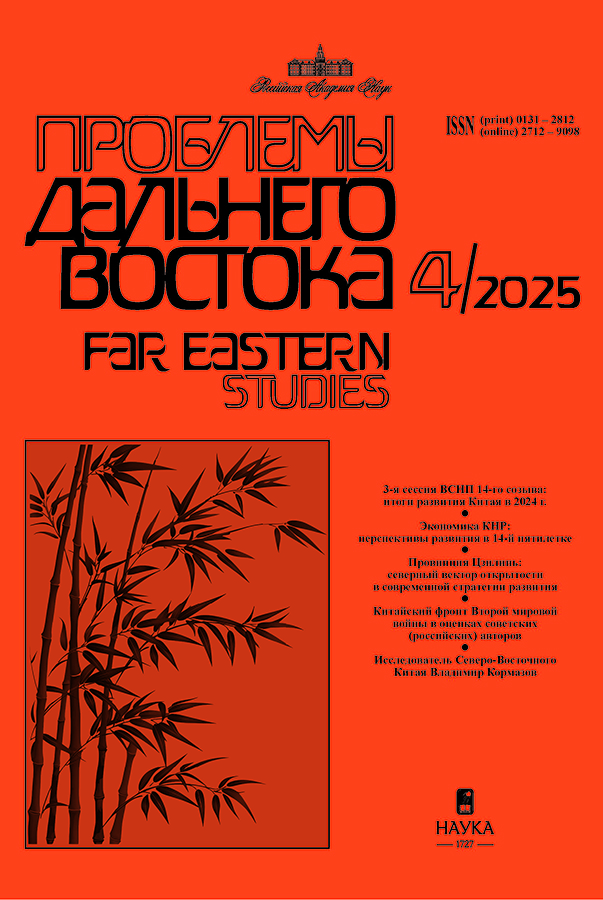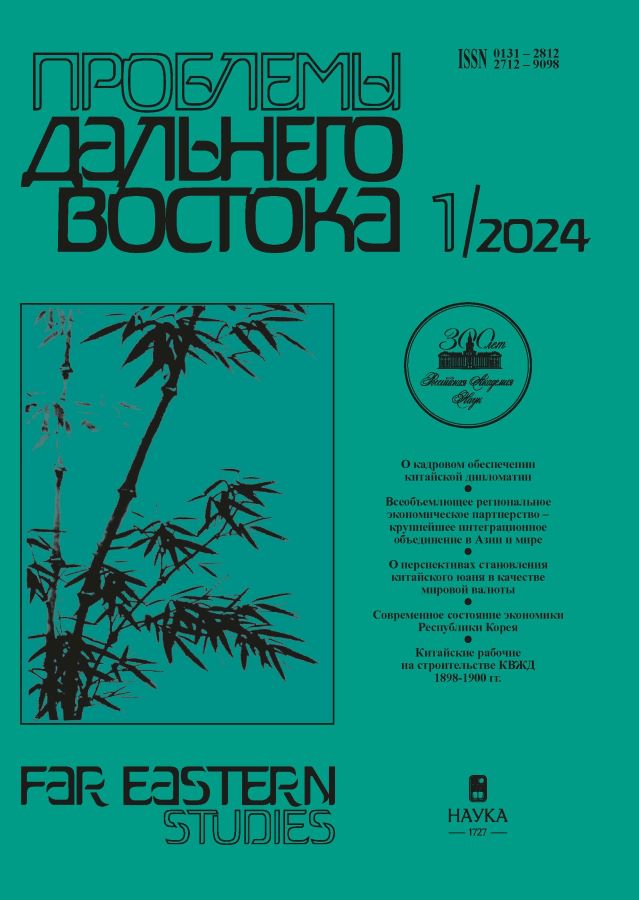Evolution of Chinese Researchers' Views on the National Interests (from the 1990s till Present)
- Authors: Han S.1
-
Affiliations:
- Lomonosov Moscow State University
- Issue: No 1 (2024)
- Pages: 46-57
- Section: Politics
- URL: https://rjmseer.com/0131-2812/article/view/676374
- DOI: https://doi.org/10.31857/S0131281224010046
- ID: 676374
Cite item
Abstract
This paper aims to contribute to this relatively under-studied field in China by analyzing the development of the Chinese academia’s definition of national interest. It wasn’t until the early 1990s the concept of national interest grew more popular and garnered the attention of the Chinese academia. During his regime in the 1990s, Jiang Zemin continued to adopt Deng Xiaoping’s policy of prioritizing economic development. But during the Hu Jintao era, Beijing began shifting from Deng and Jiang’s policy of “hide and bide” to the new peaceful development policy, of which forming a stronger diplomatic presence and influence is an important part. As such, some scholars began to argue for the importance for security interests and increasing China’s diplomatic influence, which was later confirmed by the Chinese government to be its national interest through official document. In the Xi Jinping era, new changes in the international arena prompted Xi to call for diplomacy with Chinese characteristics. Two paths laid out in front of Chinese scholars. One was a complete introspection which consisted of searching for China’s national interest purely from its history and from opinions of significant Chinese figures, combining elements of traditional Chinese philosophy. The other was to continue learning from the best practices of other great nations. The theories of Russia scholar Kortunov caught the attention of the Chinese academia. An analysis of the development of China’s national interest theories reveals that China went through discussions on public interest and economic interest, before shifting the narrative back to security and nationalism.
Keywords
About the authors
S. Han
Lomonosov Moscow State University
Author for correspondence.
Email: hanshiying@bfsu.edu.cn
ORCID iD: 0000-0001-5799-7217
Postgraduate student
Moscow, Russian FederationReferences
- Kortunov A. Russian national interests: the state of discussion. In Russia’s place in Europe: a security debate / Ed. by K.R. Spillmann, A. Wenger. Bern: Peter Lang AG. 1999. Pp. 21–45.
- Reeves J.S. The Idea of National Interest; An Analytical Study in American Foreign Policy. By Charles A. Beard, with the collaboration of GHE Smith. (New York: The Macmillan Company. 1934. Pp. ix, 583.). 1934 // American Political Science Review. Vol. 28. No. 3. Pp. 506–507.
- 王逸舟: “国家利益再思考” [Ван Ичжоу. Переосмысление национальных интересов] //中国社会科学. 2002年. 第2期. 第160–208页
- 王缉思, 王逸舟: “中国学者看世界-国家利益卷” [Ван Цзиси, Ван Ичжоу. Китайские ученые смотрят на мир. Избранные произведения. Т. 2.]. 北京: 新世界出版社, 2007年. 135页.
- 邓勇: “中国现实主义国家利益观述评” [Дэн Юн. Обзор реалистического взгляда Китая на национальные интересы] // 中国社会科学季刊, 香港. 1997年. 第3期. 135页.
- 郭兵云, 陈丽丽: “习近平国家利益观的核心要义” [Го Бинюнь, Чэнь Лили. Суть взглядов Си Цзиньпина на национальные интересы] // 中学政治教学参考. 2020年. 第15期. 第5–7页.
- 李少军: “论国家利益” [Ли Шаоцзюнь. О национальных интересах] // 世界经济与政治. 2003年. 第1期. 第4–9页.
- 郎帅: “新中国成立 70 年来中国共产党的国家利益观演进” [Лан Шуай. Эволюция взглядов Коммунистической партии Китая на национальные интересы за 70 лет с момента основания Нового Китая] // 中国石油大学学报: 社会科学版. 2019年. 第4期. 第35–39页.
- 凌胜利: “中国周边地区海外利益维护探讨” [Лин Шэнли. Обсуждение вопросов защиты зарубежных интересов в прилегающих к Китаю районах] // 国际展望. 2018年. 第1期. 第31–50页.
- 刘笑阳: “中国国家利益研究综述” [Лю Сяоян. Обзор исследований национальных интересов Китая] // 国际研究参考. 2016年. 第4期. 第47–57页.
- 刘笑阳: “国家间共同利益: 概念与机理” [Лю Сяоян. Общие интересы стран: концепция и механизм] // 世界经济与政治. 2017年. 第6期. 第102–121页.
- 刘雪莲: “摩根索的现实主义可以休矣—全球化与国家利益的新观念” [Лю Сюэлянь. Реализм Моргентау устарел: новые концепции глобализации и национальных интересов] // 世界经济与政治. 2017年. 第6期. 第41–46页.
- 门洪华, 周天勇, 蔡晨宇: “中国战略报告 (第四辑)” [Мэнь Хунхуа, Чжоу Тяньюн, Цай Чэньюй. Отчет о стратегии Китая (четвертая серия)]. 上海: 格致出版社, 2017年. 第201–216页.
- 门洪华: “中国国家利益的维护和拓展” [Мэнь Хунхуа. Поддержание и расширение национальных интересов Китая] // 国际观察. 2015年. 第6期. 第13–25页.
- 倪世雄: “冲突与合作: 现代西方国际关系理论评价” [Ни Шисюн. Конфликт и сотрудничество: оценка современной западной теории международных отношений]. 成都: 四川人民出版社, 1988年. 92页.
- 潘忠岐: “国家利益的主体性与中美安全关系” [Пань Чжунци. Субъектность национальных интересов и китайско-американские отношения в области безопасности] // 现代国际关系. 2003年. 第11期. 第11–16页.
- 庞大鹏: “国家利益与外交决策—普京执政以来的俄罗斯外交” [Пан Дапэн. Национальные интересы и решения по внешней политике. Российская дипломатия с момента прихода Путина к власти] // 世界经济与政治. 2003年. 第2期. 第59–64页.
- 宋伟: “大国的整体国家利益: 一种理论分析” [Сун Вэй. Общие национальные интересы великих держав: теоретический анализ] // 现代国际关系. 2017年. 第3期. 第37–44页.
- 宋新宁, 陈岳: “国际政治学概论” [Сун Синьнин, Чэнь Юэ. Введение в международную политику]. 北京: 中国人民大学出版社. 2000年. 115页.
- 许嘉: “中国国家利益与影响” [Сюй Цзя. Национальные интересы и влияние Китая]. 北京: 时事出版社. 2006年. 第31–39页. 方力, 赵可金: “国家核心利益与中国新外交 ” [Фан Ли, Чжао Кэджин. Национальные интересы и новая дипломатия Китая] // 国际政治科学. 2021年. 第3期. 第68–94页.
- 洪兵: “国家利益论” [Хун Бин. Теория национальных интересов]. 北京: 军事科学出版社. 1999年. 11页.
- 蒋华福, 刘军: “新时代国家安全治理战略: 体系, 理念与路径” [Цзян Хуафу, Лю Цзюнь. Стратегия управления национальной безопасностью в новую эпоху: система, концепция и путь] // 华东师范大学学报 (哲学社会科学版). 2022年. 第6期. 第105–111页.
- 金应忠, 倪世雄: “国际关系理论比较研究” [Цзинь Инчжун, Ни Шисюн. Сравнительное изучение теории международных отношений]. 北京: 中国社会科学出版社. 1992年. 119页.
- 张发林, 朱小略: “国家利益的国内基础—一个动态分析框架” [Чжан Фалинь, Чжу Сяолюэ. Внутренняя основа национальных интересов — основа динамического анализа] //太平洋学报. 2020年. 第11期. 第35–48页.
- 周建明, 王海良: “国家大战略, 国家安全战略与国家利益” [Чжан Фалинь, Чжу Сяолюэ. Внутренняя основа национальных интересов — основа динамического анализа] // 世界经济与政治. 2002年. 第4期. 第21–26页.
- 石彩霞, 宋效峰: “习近平新时代国家利益思想研究” [Ши Цайся, Сун Сяофэн. Исследование мыслей Си Цзиньпина о национальных интересах в новую эпоху] // 重庆科技学院学报: 社会科学版. 2018年. 第2期. 第1–4页.
- 余潇枫, 张泰琦: “‘和合主义’: 建构 ‘国家间认同’ 的价值范式—以 ‘一带一路’ 沿线国家为例” [Юй Сяофэн, Чжан Тайци. «Доктрина гармонии и согласия» — ценностная парадигма для построения «международной идентичности»: на примере стран вдоль инициативы «Один пояс, один путь»] // 西北师大学报 (社会科学版). 2015年. 第6期. 第5–12页.
- 俞正樑: “变动中的国家利益与国家利益观” [Ю Чжэнлян. Изменение национальных интересов и концепции национальных интересов] // 复旦学报 (社会科学版). 1994年. 第1期. 第37–42页.
- 阎学通: “中国国家利益分析” [Янь Сюэтун. Анализ национальных интересов Китая]. 天津:天津人民出版社. 1996年. 第10–15页.
Supplementary files











